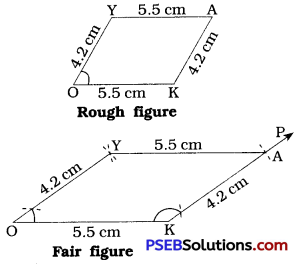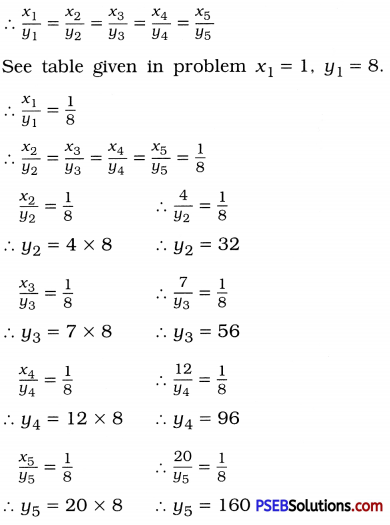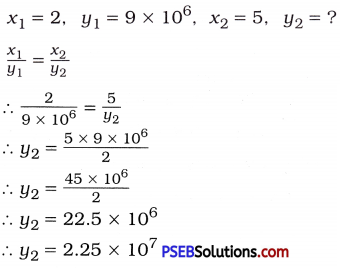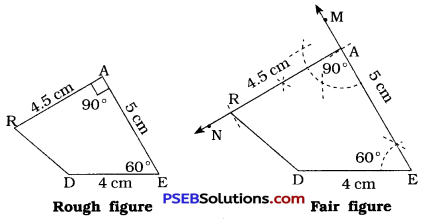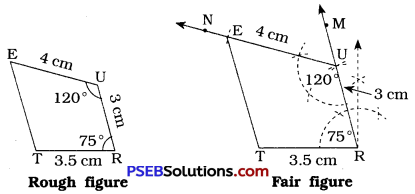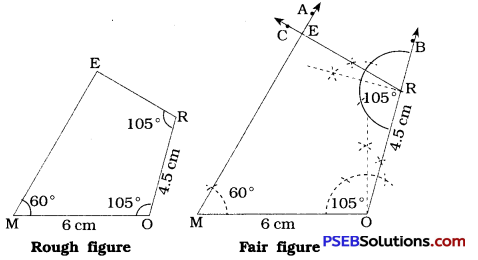Punjab State Board PSEB 8th Class Maths Book Solutions Chapter 13 Direct and Inverse Proportions Ex 13.2 Textbook Exercise Questions and Answers.
PSEB Solutions for Class 8 Maths Chapter 13 Direct and Inverse Proportions Ex 13.2
1. Which of the following are in inverse proportion?
Question (i)
The number of workers on a job and the time to complete the job.
Solution:
If the number of workers on a job increases, then time to complete the job decreases. So, it is the case of inverse proportion.

Question (ii)
The time taken for a journey and the distance travelled in a uniform speed.
Solution:
Here, the speed is uniform.
∴ The time taken for a journey is directly proportional to the speed. So, it is not the case of inverse proportion.
Question (iii)
Area of cultivated land and the crop harvested.
Solution:
For more area of cultivated land, more crops would be harvested. So, it is not the case of inverse proportion.
Question (iv)
The time taken for a fixed journey and the speed of the vehicle.
Solution:
If speed of vehicle is more, then time to cover the fixed journey would be less. So, it is the case of inverse proportion.
Question (v)
The population of a country and the area of land per person.
Solution:
For more population, less area per person would be in the country. So, it is a case of inverse proportion.

2. In a Television game show, the prize money of ₹ 1,00,000 is to be divided equally amongst the winners. Complete the following table and find whether the prize money given to an individual winner is directly or inversely proportional to the number of winners?
| Number of winners |
1 |
2 |
4 |
5 |
8 |
10 |
20 |
| Prize for each winner (in ₹) |
1,00,000 |
50,000 |
… |
… |
… |
… |
… |
Solution:
Here, more the number of winners, less is the prize money for each winner.
∴ This is a case of inverse proportion.
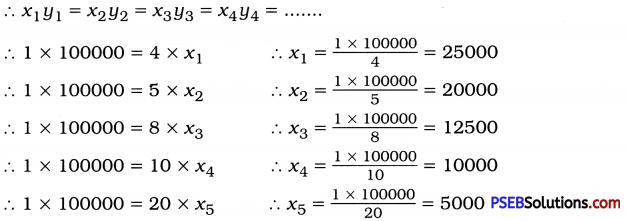
Now, the table is as follows:
| Number of winners |
1 |
2 |
4 |
5 |
8 |
10 |
20 |
| Prize for each winner (in ₹) |
1,00,000 |
50,000 |
25,000 |
20,000 |
12,500 |
10,000 |
5,000 |
3. Rehman is making a wheel using spokes. He wants to fix equal spokes in such a way that the angles between any pair of consecutive spokes are equal. Help him by completing the following table:

| Number of spokes |
4 |
6 |
8 |
10 |
12 |
| Angle between a pair of consecutive spokes |
90° |
60° |
… |
… |
… |

Question (i)
Are the number of spokes and the angles formed between the pairs of consecutive spokes in inverse proportion?
Solution:
Here, more the number of spokes, less the measure of angle between a pair of consecutive spokes.
∴ This is a case of inverse proportion.
Here,
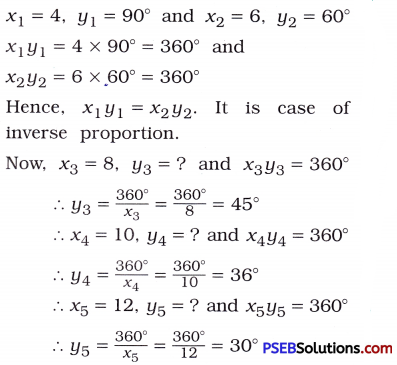
Now, the table is as follows:
| Number of spokes |
4 |
6 |
8 |
10 |
12 |
| Angle between a pair of consecutive spokes |
| 90° |
60° |
45° |
36° |
30° |
Question (ii)
Calculate the angle between a pair of consecutive spokes on a wheel with 15 spokes.
Solution:
Let the measure of angle be x°.
∴ 15 × x° = 4 × 90°
∴ x° = \(\frac{4 \times 90^{\circ}}{15}\) = 24°
Hence, this angle should be 24°.
Question (iii)
How many spokes would be needed, if the angle between a pair of consecutive spokes is 40°?
Solution:
Let the number of spokes be n.
∴ n × 40° = 4 × 90°
∴ n = \(\frac{4 \times 90^{\circ}}{40^{\circ}}\) = 9
Thus, 9 spokes would be needed.
4. If a box of sweets is divided among 24 children, they will get 5 sweets each. How many would each get, if the number of the children is reduced by 4?
Solution:
| Number of children x |
Number of sweets y |
| x1 = 24 |
y1 = 5 |
| x2 = 24 – 4 = 20 |
y2 = (?) |
Here, if the number of children decreases, then the number of sweets received by each child will increase.
∴ This is a case of inverse proportion.
x1 × y1 = x2 × y2
∴ 24 × 5 = 20 × y2
∴ y2 = \(\frac{24 \times 5}{20}\) = 6
Thus, each child will get 6 sweets.

5. A farmer has enough food to feed 20 animals in his cattle for 6 days. How long would the food last if there were 10 more animals in his cattle?
Solution:
| Number of animals x |
Number of days y |
| x1 = 20 |
y1 = 6 |
| x2 = 20 + 10 = 20 |
y2 = (?) |
Here, the number of animals increases, so the number of days to feed them will decrease.
∴ This is a case of inverse proportion.
∴ x1 × y1 = x2 × y2
∴ 20 × 6 = 30 × y2
∴ y2 = \(\frac{20 \times 6}{30}\) = 4
Thus, the food will last for 4 days.
6. A contractor estimates that 3 persons could rewire Jasminder’s house in 4 days. If, he uses 4 persons instead of three, how long should they take to complete the job?
Solution:
| Number of persons x |
Number of days y |
| x1 = 42 |
y1 = 63 |
| x2 = (?) |
y1 = 63 |
Here, more the number of persons, less will be the time required to complete the job.
∴ This is a case of inverse proportion.
∴ x1 × y1 = x2 × y2
∴ 3 × 4 = 4 × y2
∴ y2 = \(\frac{3 \times 4}{4}\) = 3
Thus, 3 days will be required to complete the job.

7. A batch of bottles were packed in 25 boxes with 12 bottles in each box. If the same batch is packed using 20 bottles in each box, how many boxes would be filled?

Solution:
| Number of bottles in a box x |
Number of boxes y |
| x1 = 12 |
y1 = 25 |
| x2 = 20 |
y2 = (?) |
Here, more the number of bottles in a box, less would be the number of boxes.
∴ This is a case of inverse proportion.
∴ x1 × y1 = x2 × y2
∴ 3 × 4 = 4 × y2
∴ y2 = \(\frac{3 \times 4}{4}\) = 3
Thus, 15 boxes would be filled.
8. A factory requires 42 machines to produce a given number of articles in 63 days. How many machines would be required to produce the same number of articles in 54 days?
Solution:
| Number of machines x |
Number of days y |
| x1 = 42 |
y1 = 63 |
| x2 = (?) |
y2 = 54 |
Here, if the number of days will be less, the number of machines required will be more.
∴ This is a case of inverse proportion.
∴ x1 × y1 = x2 × y2
∴ 42 × 63 = x2 × 54
∴ x2 = \(\frac{42 \times 63}{54}\) = 49
Thus, 49 machines would be required.

9. A car takes 2 hours to reach a destination by travelling at the speed of 60 km/h. How long will it take when the car travels at the speed of 80 km/h?
Solution:
| Speed (km/h) x |
Number of hours y |
| x1 = 60 |
y1 = 2 |
| x2 = 80 |
y2 = (?) |
Here, if the speed of car increases, then the time taken to cover the same distance will decrease.
∴ This is a case of inverse proportion.
∴ x1 × y1 = x2 × y2
∴ 60 × 2 = 80 × y2
∴ y2 = \(\frac{60 \times 2}{80}=\frac{3}{2}=1 \frac{1}{2}\) h
Thus, car would take 1\(\frac {1}{2}\) hours.
10. Two persons could fit new windows in a house in 3 days.
Question (i)
One of the persons fell ill before the work started. How long would the job take now?
Solution:
| Number of persons x |
Number of days y |
| x1 = 2 |
y1 = 3 |
| x2 = 2 – 1 = 1 |
y2 = (?) |
Here, less the number of persons, more would be the number of days to complete the job.
∴ This is a case of inverse proportion.
∴ x1 × y1 = x2 × y2
∴ 2 × 2 = 1 × y2
∴ y2 = \(\frac{2 \times 3}{1}\) = 6
Thus, it would take 6 days to complete the job.
Question (ii)
How many persons would be needed to fit the windows in one day?
Solution:
| Number of days x |
Number of persons y |
| x1 = 3 |
y1 = 2 |
| x2 = 1 |
y2 = (?) |
Here, less the number of days, more will be the number of persons needed.
∴ This is a case of inverse proportion.
∴ y2 = ? and x2 = 1
∴ x1 × y1 = x2 × y2
∴ 3 × 2 = 1 × y2
∴ y2 = \(\frac{3 \times 2}{1}\) = 6
Thus, 6 persons would be needed.

11. A school has 8 periods a day each of 45 minutes duration. How long would each period be, if the school has 9 periods a day, assuming the number of school hours to be the same?
Solution:
| Number of periods x |
Length of each period (in minute) y |
| x1 = 8 |
y1 = 45 |
| x2 = 9 |
y2 = (?) |
Here, the number of periods is more, then the length of each period will be less.
∴ This is a case of inverse proportion.
∴ x1 × y1 = x2 × y2
∴ 8 × 45 = 9 × y2
∴ y2 = \(\frac{8 \times 45}{9}\) = 40
Thus, each period would be of 40 minutes.
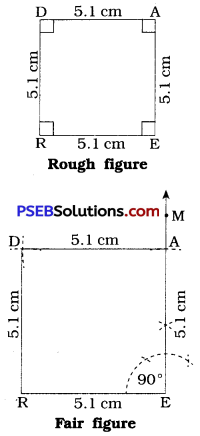
![]()
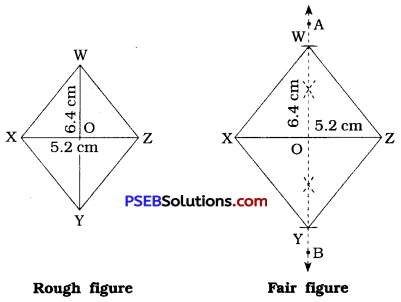
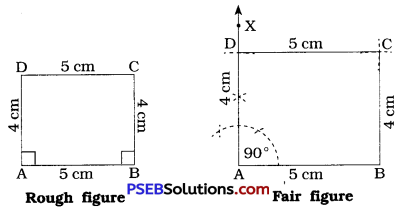
![]()
